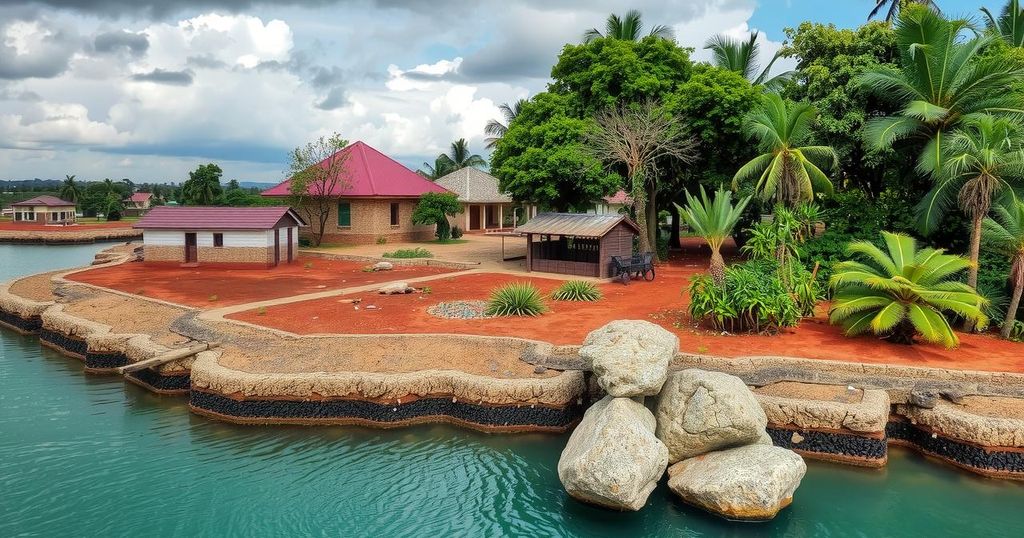Climate change
AFRICA, CHI, CHIDO, CLIMATE, CLIMATE CHANGE, CLIMATE CHANGE AND METEOROLOGICAL SERVICES, FRENCH INDIAN OCEAN, GLOBAL WARMING, GUY TAYLOR, INAM, LUCY MTILATILA, MALAWI, MOZAMBIQUE, NATIONAL INSTITUTE OF METEOROLOGY, NATURAL DISASTERS, PARIS AGREEMENT, PEMBA, UNICEF, ZIMBABWE
Jamal Walker
0 Comments
Cyclone Chido Exposes Southern Africa to Increasing Climate Challenges
Cyclone Chido has recently hit northern Mozambique, displacing thousands and intensifying concerns over climate change and extreme weather. Recent cyclones have raised alarms about the frequency of such storms in Southern Africa. Humanitarian groups, including UNICEF, are responding to the immediate needs, but long-term impacts on infrastructure and food security remain concerning. Improved disaster preparedness is noted in Malawi, but further support is needed to enhance resilience against future climate challenges.
Cyclone Chido has wreaked havoc across northern Mozambique, having made landfall after striking the French Indian Ocean island of Mayotte on December 15, 2024. This catastrophe has displaced countless residents in the Cabo Delgado and Nampula provinces and marks a continuation of extreme weather events impacting southern Africa. Historical cyclones, including Cyclone Freddy in 2023 and Cyclone Idai in 2019, have battered the region, underlining a disturbing trend of increasing cyclone frequency due to climate change.
Experts indicate that the escalating temperatures of the Indian Ocean are creating conditions ripe for cyclone development. Lucy Mtilatila, the Director of Climate Change and Meteorological Services in Malawi, emphasized the growing frequency of such storms, noting, “Right now, we are seeing that indeed climate change is affecting us. We used to have tropical cyclones affecting Malawi, but it was maybe once in 10 years. But right now, you can see the frequency.”
Cyclone Chido unleashed destructive winds of up to 260 km/h (160 mph) and heavy rains, resulting in two reported fatalities and significant property damage. The National Institute of Meteorology (INAM) reported over 250 millimeters (10 inches) of rainfall within a mere 24 hours, exacerbating humanitarian needs in an already vulnerable region. Humanitarian organizations like UNICEF have expressed serious concern regarding both the immediate and long-term consequences, as children and families face interruptions in education and healthcare, and the risks of waterborne diseases surge.
Emergency shelters have been established for approximately 2,800 individuals in Pemba. However, much of the true extent of the damage remains undetermined due to ongoing communication disruptions in some affected areas. Moreover, Malawi and Mozambique are still in the process of recovering from previous natural calamities, which complicates their response to Cyclone Chido. Luisa Meque, head of Mozambique’s National Institute for Risk and Disaster Management, stated that assessments of the cyclone’s damages were still underway, with concerns about its potential to worsen existing food insecurity.
Despite the scale of destruction, preparedness measures in Malawi have improved since previous cyclones, with better coordination between national and local institutions in handling disaster responses. Mtilatila acknowledged, “I think the coordination now is very good. We have so many sectors that are coming in to work together to respond to such kind of disasters.”
Looking forward, the Malawian government took proactive steps prior to the cyclone by ordering food and relief supplies. The nation, already grappling with drought and hunger, faces a precarious situation, as Mtilatila articulated, “Last year was not a good year for us because of El Nino, the yields, the harvest yield were not as good.” Organizations like UNICEF and the UN World Food Program are critical to ongoing relief efforts, and experts underscore the urgent need for increased global support to bolster resilience and combat climate change.
The article discusses the severe impacts of Cyclone Chido, emphasizing the broader trends of climate change resulting in increased cyclone frequency and intensity in southern Africa. As Malawi and Mozambique face repeated cyclone events, the impact on infrastructure, food security, and public health has become increasingly dire. The narrative highlights government and humanitarian efforts in response to these disasters, as well as the urgent need for comprehensive strategies to mitigate future risks and build resilience against climate change.
In conclusion, Cyclone Chido exemplifies the perilous effects of climate change on southern Africa, particularly in Mozambique and Malawi. Immediate humanitarian efforts are crucial, but longer-term strategies focusing on resilience, infrastructure development, and climate adaptation are imperative to safeguard communities against the growing threats of extreme weather. Increased international support is necessary to aid in recovery and to address the underlying causes of vulnerability to climate-induced disasters.
Original Source: www.dw.com




Post Comment